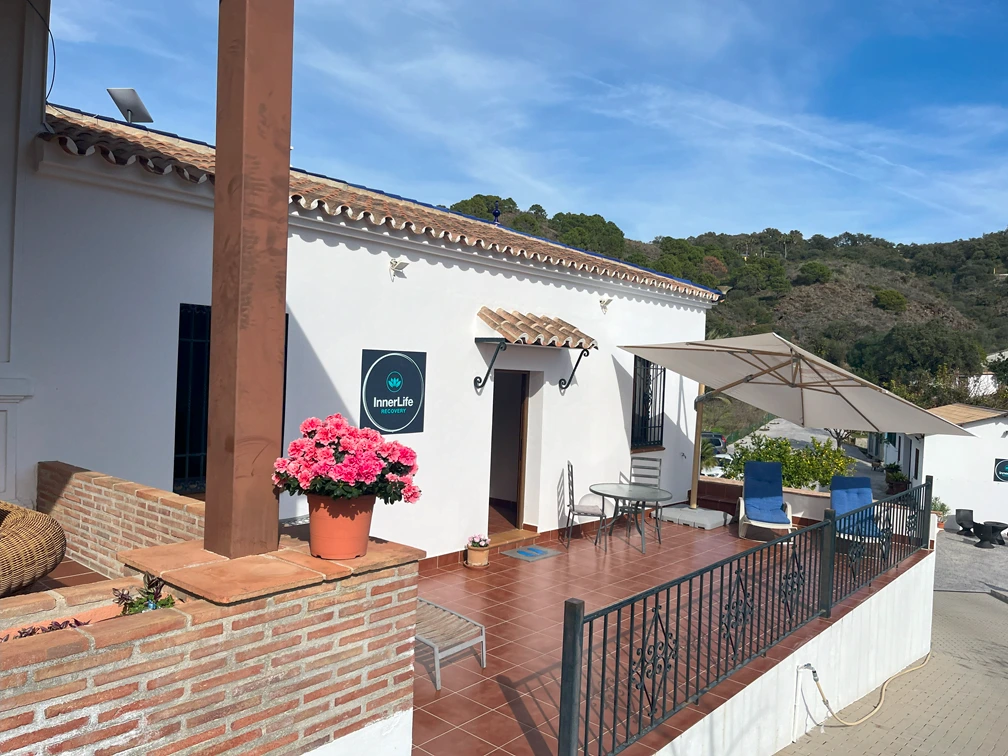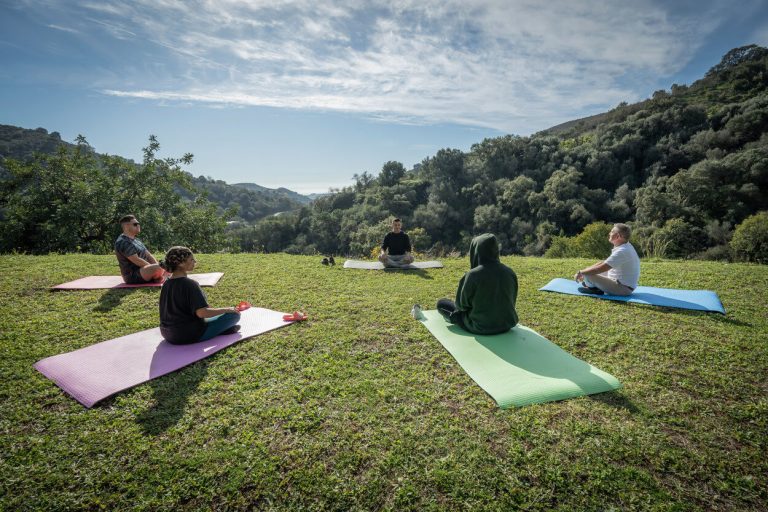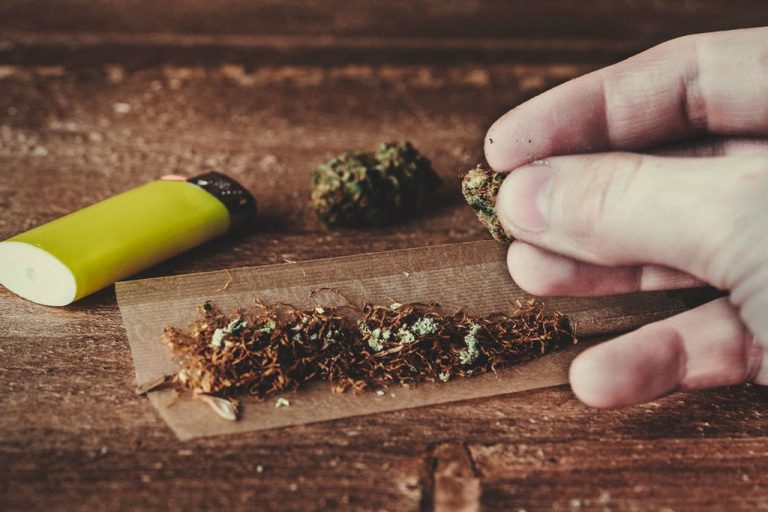
Attending cocaine rehab in Spain offers more than just a standard clinical approach to drug recovery. Being in an environment that is conducive to healing can be just as powerful a factor in treatment as any other therapeutic practice.
Cocaine addiction, with its withdrawal symptoms, intense cravings and high potential for relapse, can destroy lives. In this light, it’s important to understand that clinical approaches to recovery are essential. These include cognitive behavioural therapy (CBT) and dialectical behavioural therapy (DBT).
Centres like InnerLife Recovery near Marbella involve a wide range of these kinds of therapies, while also incorporating more meditative practices such as yoga and healthy lifestyle coaching. This all depends on the individual, however. We tailor our treatment plans based on their needs and interests.
What is rehab for cocaine addiction?
Rehab for cocaine addiction is a well-rounded and clinical approach to helping people overcome addiction to cocaine. The point of this process is to address why physical dependence exists in the first place. Contrary to common myths, it’s not about forcing someone off the drug until they no longer want it. In reality, a person normally has deep-rooted, underlying reasons for their reliance on a drug, be it cocaine or any other drug. Rehab for cocaine addiction is therefore about rooting out the psychological reasons someone has to be dependent on this drug.
That being said, treatment always starts with the “weaning off” process, formally known as detoxification. This is where the body is sometimes cleared of the drug under medical supervision. It is not impossible to detox on your own, but it is not recommended. This is because withdrawal symptoms, particularly with a strong stimulant drug like cocaine, can be very powerful. It can be very difficult to handle these symptoms on your own.
Detox lays the base for further therapeutic interventions. Following this phase, the main part of rehab for cocaine addiction involves various therapies and treatments, which, as mentioned, are designed with the individual in mind to address their unique psychological root causes for addictive behaviour. The point is not to tell you why what you’re doing is bad or wrong. It is not about judgement or condemnation. Instead, it is to get you to understand, on an objective level, why you have been psychologically reliant on external substances. We will give you coping strategies and guidance to ensure relapse prevention after treatment is complete.
The most popular psychotherapeutic practises in rehab are:
- Cognitive behavioural therapy: To identify and modify negative thoughts patterns
- Motivational enhancement therapy: To increase motivation and incentive for sobriety
- Contingency management: To use stimulus control and consequences to manage behaviour
Group counselling and support groups, such as Cocaine Anonymous, are also available to provide a community of support, where you can share experiences and receive strategies for maintaining sobriety.
Other aspects of rehab for cocaine addiction
Dual diagnosis is another critical part of rehab. The point here is to address co-occurring mental health disorders that come alongside addiction. The reason this is important is because many people with cocaine addiction also suffer from underlying conditions such as anxiety, depression, trauma and PTSD. In many cases, these conditions may even be the reason or a contributing factor for why they have developed a cocaine dependence issue as a coping mechanism. Regardless, if these conditions are left untreated, it can further complicate the recovery process.
Inpatient rehab programs such as the ones provided by InnerLife Recovery, are essential for those with severe addiction. It provides a structured and supportive environment free from distraction or temptation. Programs can last from 28 to 90 days, depending on the needs of the individual. They also include a range of therapeutic activities, mental health counselling, and aftercare planning, for long-term recovery.
How to stop taking cocaine
Stopping cocaine can require one-on-one therapy, medical and professional help. The overpowering nature of withdrawal symptoms and potency of most drugs means that individuals often struggle to undergo recovery on their own. With that being said, though, here are some tips about how cocaine recovery works and some advice you can take to begin:
1. Mindset
Quitting cocaine doesn’t begin and end with immediately cutting out the drug and stopping use. All that would do is introduce strong cravings and lead you back to it. An addiction exists inside you. That means, in order to get control over it, you have to understand why it exists, and then you have to introduce the desire to get clean. This means a series of incentives that give you powerful emotional reasons to stay off the drug. It could be family, children, or general health and happiness. Everyone has a reason. InnerLife Recovery is here to help you find it. It all starts with mindset.
2. Share your goals
As we said, stopping use of a powerful narcotic is very difficult to do alone. While we recommend that our providers should be your first go-to, you should do your best to share your intentions and personal goals with people close to you. Establishing a support network in as many ways as possible, to help keep you accountable is an important part of recovery.
3. Incrementally change habits
Changing habits is a very difficult thing to do. It involves breaking routines and patterns that we have grown very strongly accustomed to. However, in theory it is very simple if you do it slowly and piecemeal.
For example, on day one, you might simply stop answering calls from certain friends. On day two, you might stop going to social scenes that trigger cravings. Incremental improvement is a key aspect of CBT that we use to help you better yourself without becoming overwhelmed.
4. Use distraction techniques
Replacing dependence on a drug is not an easy thing to do. You can’t just replace your drug addiction with a sport or hobby, for example. Unfortunately it is not that easy; you do have to address underlying causes with medical help if you want a permanent solution. However, exercise, hobbies and other healthy activities are very important to include as part of a long-term recovery strategy. At InnerLife Recovery, we want you to have a well-rounded treatment plan that includes activities and hobbies that keep you going post-rehab.
5. Complete abstinence:
Stopping cocaine can require one-on-one therapy, medical and professional help. The overpowering nature of withdrawal symptoms and potency of most drugs means that individuals often struggle to undergo recovery on their own. With that being said, though, here are some tips about how cocaine recovery works and some advice you can take to begin:
Why should I consider cocaine rehab abroad?
The main reason you’d choose rehab abroad is because most of your triggers are linked to your home environment. In order to truly benefit from recovery, it is essential that you take your body and mind away from the place that it automatically links to cocaine use. A fresh physical atmosphere and a warm climate are essential backdrops to successful treatment.
Rehab abroad is also completely anonymous. The stress of being seen or feeling vulnerable is not present here. Social stigma of addiction treatment is a very real thing which we understand. This is especially true for people in high-profile positions. Confidentiality and discretion makes it a lot easier for you to commit to treatment without worrying about public perception or professional repercussions.
Why should I consider InnerLife Recovery in Spain?
InnerLife Recovery in Marbella, Spain is unique in that all of our staff are professionals who come from a background of addiction themselves. So, when we say that our approach is personal, we mean that we understand your struggles on a deep, inner level.
We don’t just treat you by-the-book. We want you to feel understood and heard, in a completely judgement free, serene environment. Recovery is not just a rational, medical process. It is an intimate and emotional one.
For us, being in a secluded environment near Marbella, allows us to drop into the exact kind of environment needed for us to use our skills and experiences to heal you.




